Catena is now Pearl Talent! Same mission, new name.
You don’t need another reminder that admin work eats up your team’s time. You see it every day: in the backlog of charting, the late insurance follow-ups, the missed intake forms that should’ve been handled hours ago. Most clinics aren’t short on effort, but short on capacity.
That’s exactly where a virtual assistant comes in. We’re not talking about entry-level generalists or someone you have to micromanage over Slack. This is a trained professional who knows revenue cycle management, your systems, patient workflows, and documentation standards.
At Pearl Talent, we place virtual assistants aligned with your timezone preferences and experienced with tools like Athenahealth and eClinicalWorks. We handle sourcing, onboarding, and payroll so you don’t have to.
What does bringing this kind of support into healthcare practices look like? This guide breaks down exactly what a medical virtual assistant can do for your team. You’ll see where the value lies, what tasks to delegate, and how this approach can save your team hours without sacrificing care quality.
What Does a Virtual Healthcare Assistant Do?
A virtual assistant for doctors handles the admin work your team may not have time for: scheduling, insurance checks, documentation, and patient follow-ups. They work inside your systems, know the workflows, and take tasks off your plate without slowing anything down.
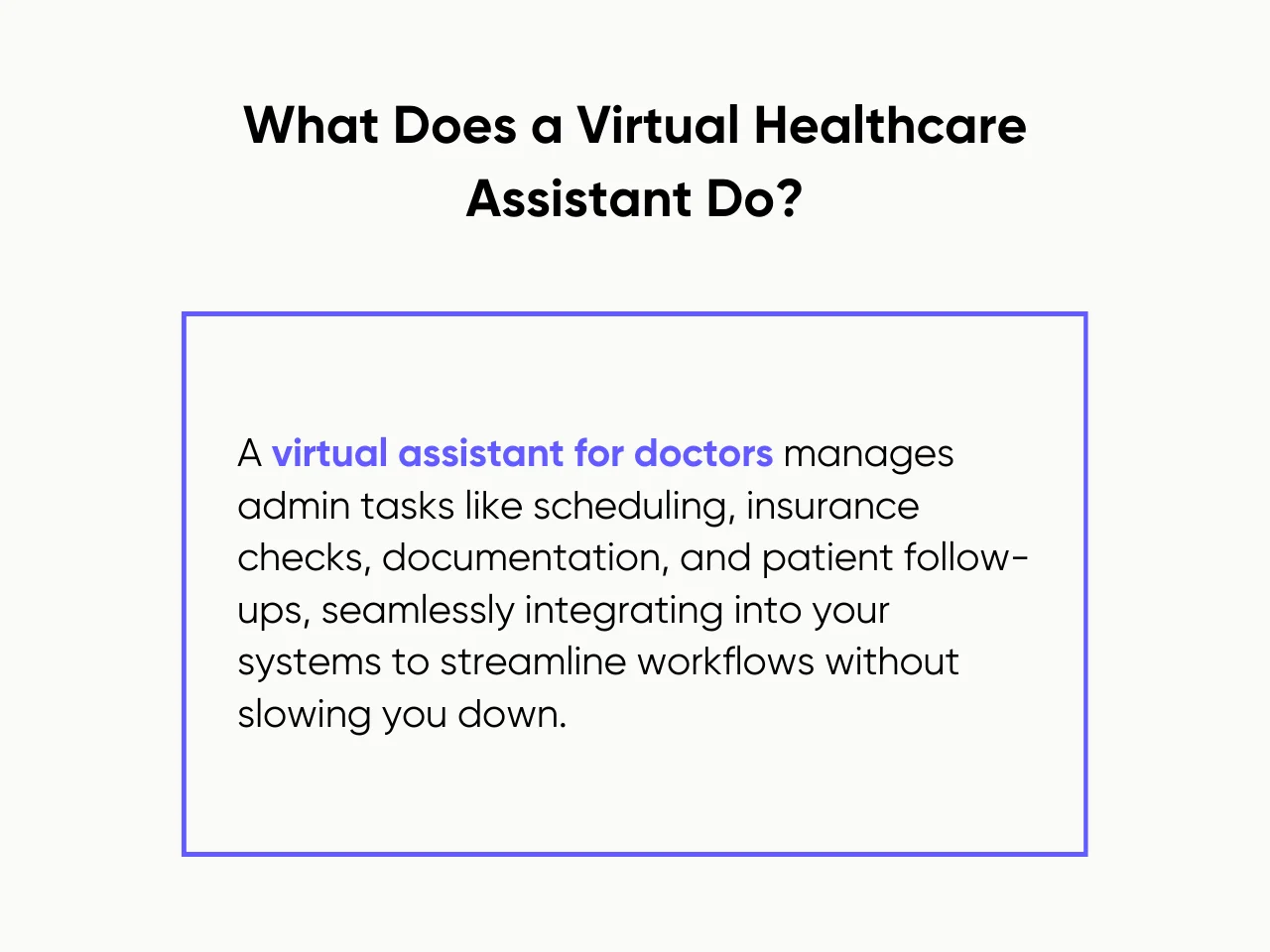
This isn’t general admin help. A strong healthcare virtual assistant understands how to move through an EHR and handles patient coordination with absolute accuracy. They're there to keep things clean and moving, not create more work for your staff.
Here’s what that looks like in practice:
- Appointment scheduling and reminders
- Insurance verification and pre-authorizations
- Intake forms and EHR data entry
- Patient messages and follow-ups
- Billing support and claim tracking
- Live scribing or documentation cleanup
- Prescription refills and lab result coordination
At Pearl Talent, every medical virtual assistant we place is pre-vetted for compliance, tool fluency, and timezone fit. Whether you’re on Athena, eClinicalWorks, or Kareo, they’ll plug in fast and start making a difference from day one.
How Medical VAs Help Healthcare Providers Operate More Efficiently
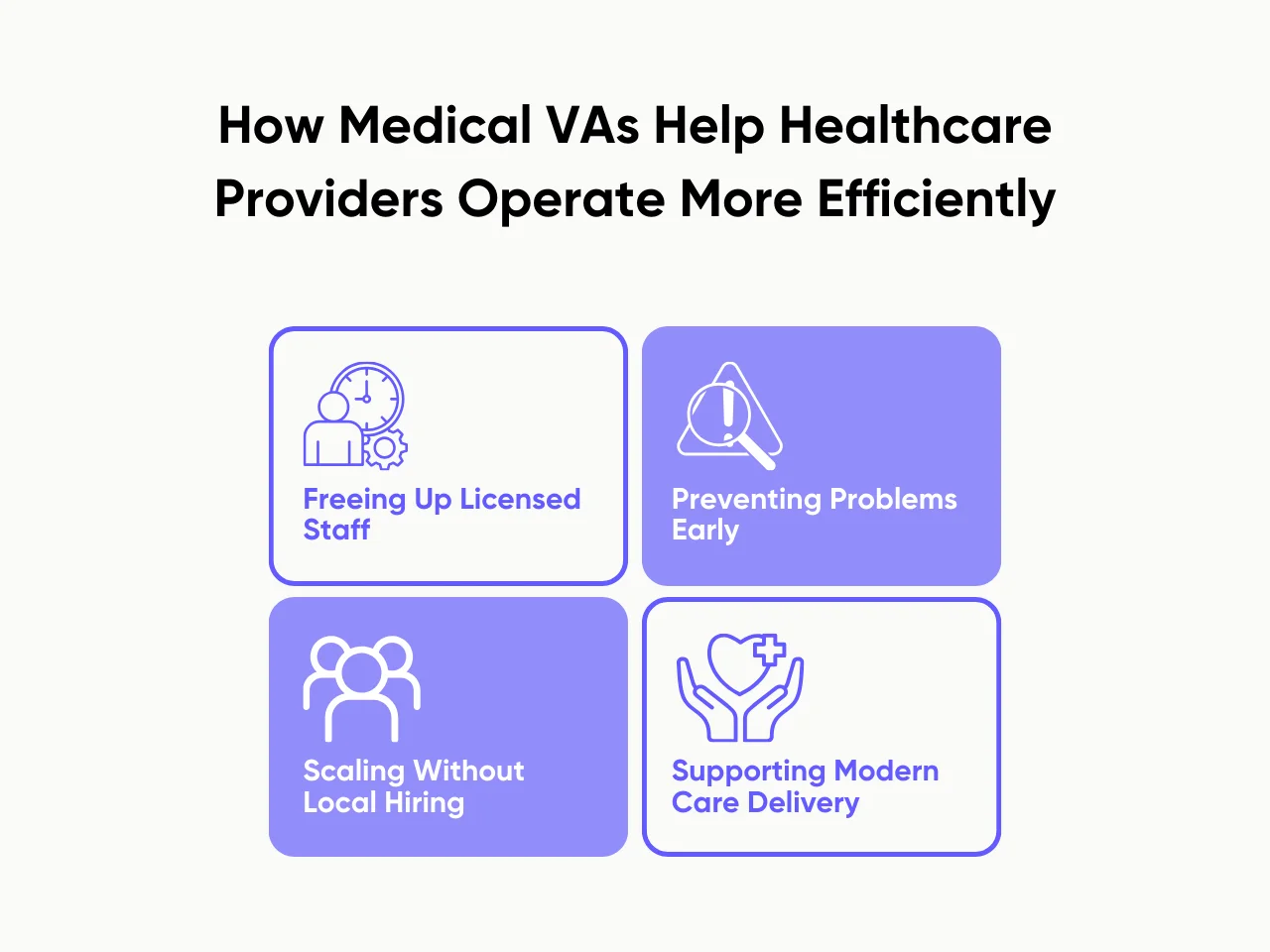
It’s not that your team isn’t trying. They’re likely maxed out, and the support structure behind them hasn’t scaled with demand. As a result, administrative tasks pile onto providers’ desks, follow-ups can get delayed, and you end up reacting to recurrent issues.
A virtual assistant for doctors can help you reclaim capacity. Here’s what that looks like in real terms:
Offloading the Work That Slows Down Licensed Staff
In a 2023 study from the National Library of Medicine, over 50% of physician time was spent on non-clinical tasks. Besides being simply inefficient, it also drains your team’s morale and jeopardizes your patient’s experience.
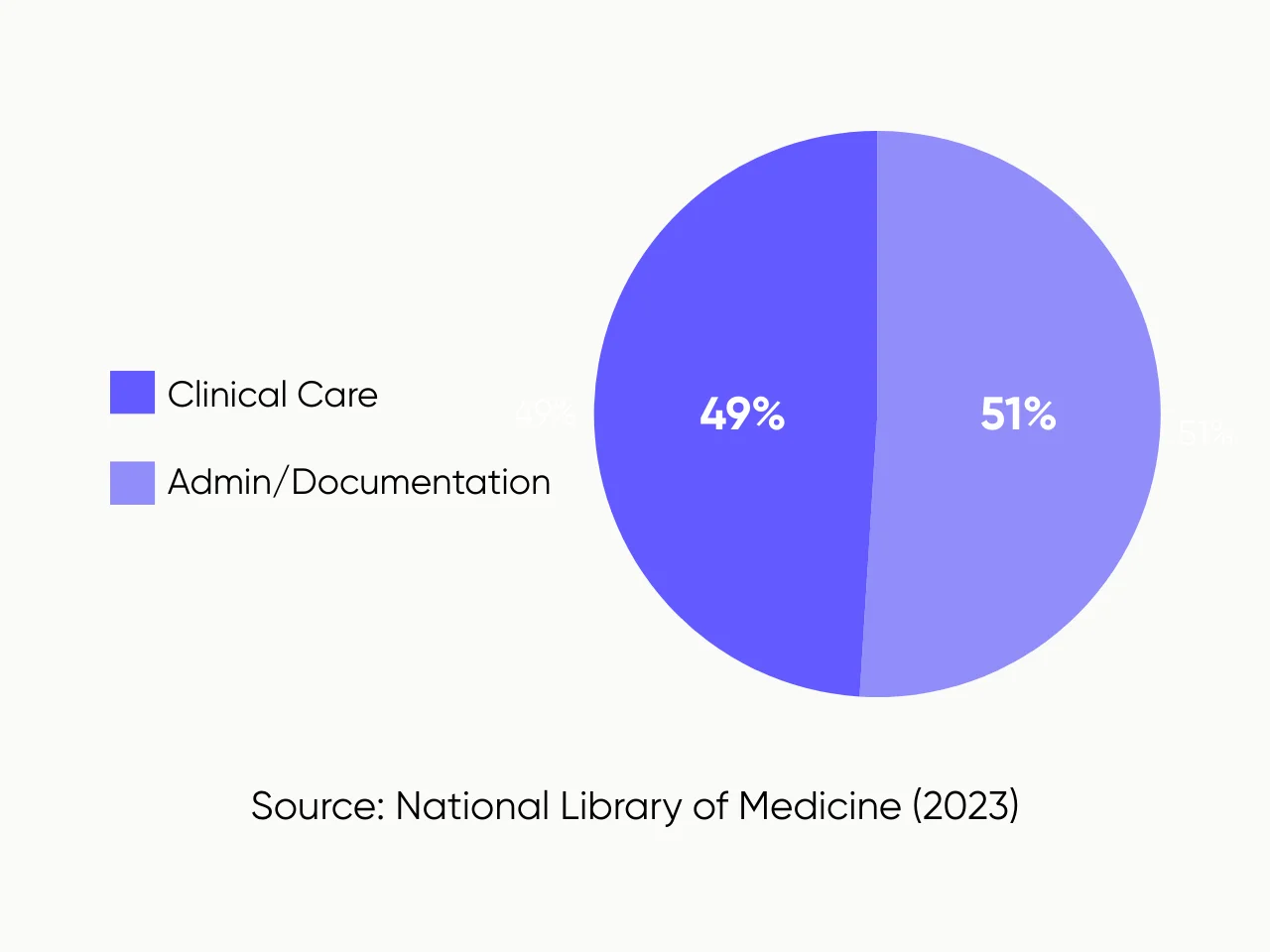
Doctors (and nurses) shouldn't be rescheduling appointments or entering intake data into the EHR at 7 PM. But that’s exactly what’s happening in most clinics today.
A healthcare virtual assistant takes those loops off their plate. They can help triage messages, update charts, prep visits, and follow up on labs so your licensed team can actually focus on care instead of clicking through workflows.
Preventing Small Problems Before They Snowball
Most delays happen because no one had the time to double-check something small, like insurance not being verified or labs not followed up. But more fundamentally, how can we optimize the workflow when the scheduled patients simply don’t show up?
In fact, SCI Solutions found that clinics lose around $200 an hour on missed appointments. No-shows also account for up to 30% of all scheduled visits in the United States.
That’s exactly the gap a medical VA can fill. If missed appointments persist despite existing efforts, virtual support can handle confirmations, cancellations, and insurance checks.
Scaling Without Waiting on Local Headcount
Whether you’re expanding hours, opening a new location, or just trying to stay caught up, waiting weeks to hire locally often isn’t realistic.
With virtual medical assistant services, you can scale in days, not months. At Pearl Talent, we shortlist fully vetted candidates in under 10 business days. You get qualified help fast, without locking into long contracts or spending hours on interviews.
Supporting the Way Care Is Delivered Now
Not everything happens in the exam room anymore. Between telehealth, remote patient monitoring, and digital follow-ups, a lot of care now depends on how well your backend operates, especially when your team isn’t in the same room as the patient.
A virtual assistant for doctors is already built for this kind of workflow. They’re used to working in secure, digital environments. They manage telehealth logistics, send reminders, handle documentation in real time, and follow up on treatment plans, without pulling your in-house team off their lane.
This kind of support lets you offer modern, responsive care without stretching your existing staff thin. And it shows: patients notice when the experience is smooth, even after the visit ends.
Common Tasks You Can Delegate to a Virtual Medical Assistant
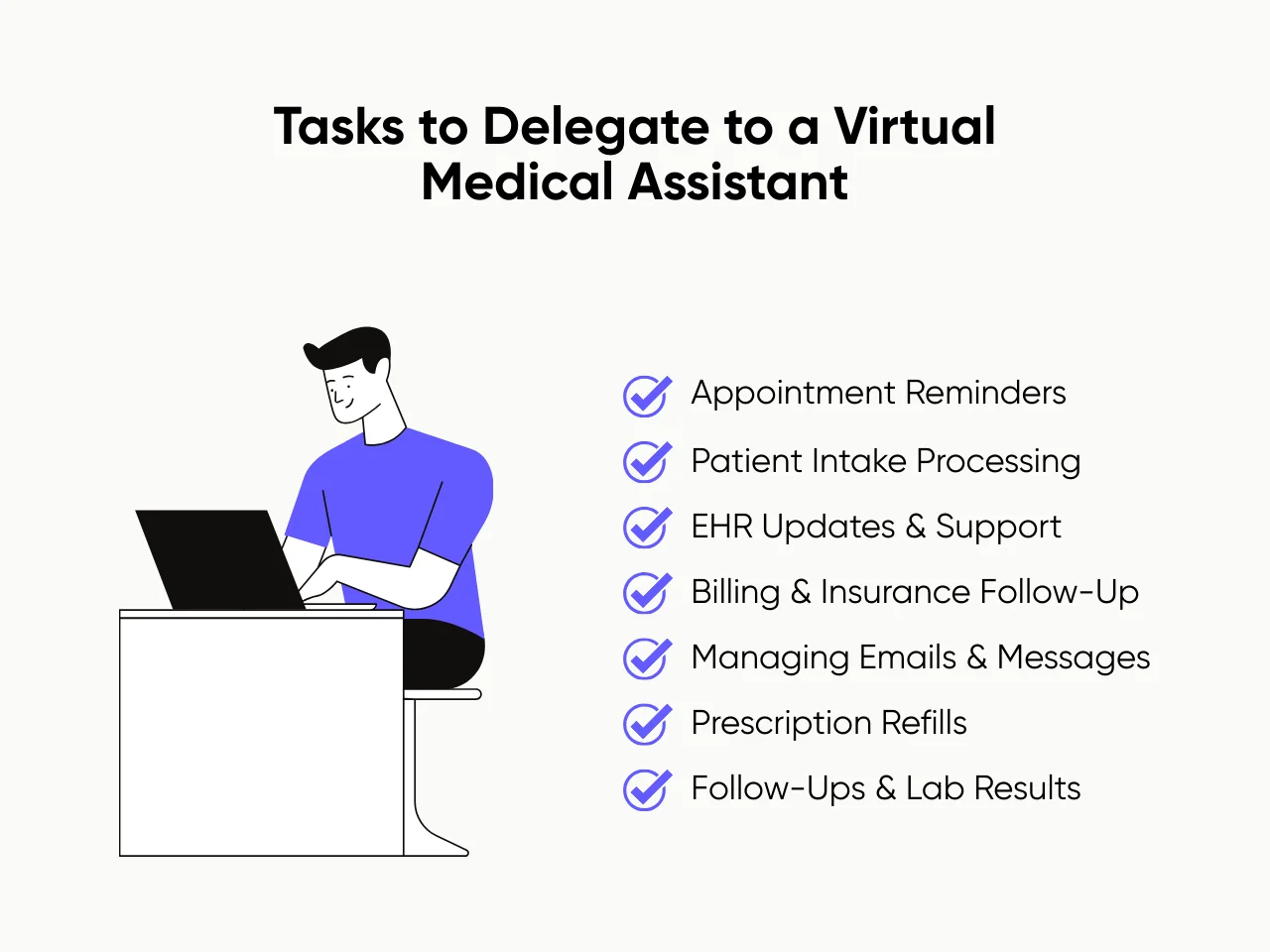
Delegating isn’t about offloading busywork. It’s about reclaiming time by handing full slices of your workflow to someone trained to own them. A strong virtual medical assistant makes your team leaner and faster without cutting corners on care.
Below are the most common tasks that may slow teams down if they stay in-house too long, which healthcare VAs can help you manage every day:
1. Appointment Confirmations and Reminders
Gaps in the schedule cost you money. A medical virtual assistant can handle confirmation calls, reschedules, cancellations, and even flag frequent no-shows so your team isn’t chasing empty slots or flying blind.
2. Patient Intake Processing
Intake bottlenecks delay providers, and, worse, frustrate patients. VAs review forms, check for missing info, follow up with patients, and push clean patient data into the EHR before the visit even starts.
3. EHR Updates and Documentation Support
Providers shouldn’t spend evenings updating meds or cleaning up charts. A virtual assistant can pre-load visit templates, enter vitals or histories, and flag incomplete medical records so your team can wrap their day on time.
4. Medical Billing Assistance and Insurance Follow-Up
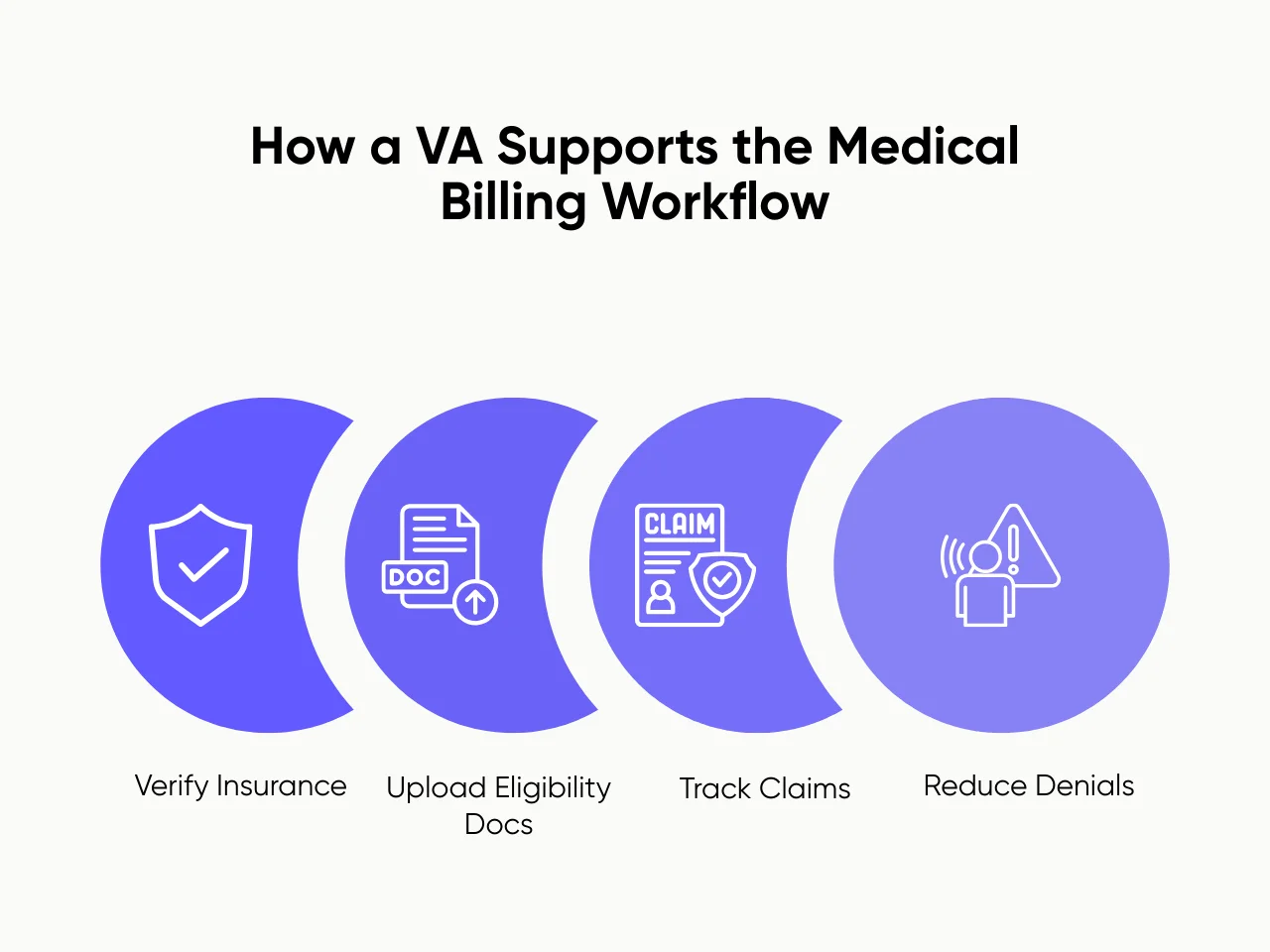
A good billing cycle starts before the visit. VAs verify insurance, upload eligibility docs, and track claims to reduce denial rates and get revenue in the door faster.
5. Managing Email or Patient Messages
Inbox overload is real. Your VA can triage messages, respond to basic patient inquiries, escalate the right ones, and log everything properly, without pulling your staff off task.
6. Prescription Refill Coordination
Refills can turn into distractions fast. VAs track requests, prep approval forms, and update patients so your team can focus on active cases, not callbacks.
7. Post-Visit Follow-Ups and Lab Results Communication
Patient experience doesn’t end after the visit. VAs follow up on labs, send out instructions, and catch the details others might miss. That kind of follow-through is what drives high patient satisfaction.
At Pearl Talent, we place candidates around your actual workflow. And we don’t just drop someone in. We will help you identify the tasks that cause friction, then match you with the talent who can handle them with minimal training required.
Practical Examples of Impact on a Medical Practice
Bringing on a virtual assistant for doctors doesn’t just lighten the load. It can stabilize the entire workflow behind your care delivery. When the right tasks are offloaded, your team starts running ahead, not constantly catching up.
At Pearl Talent, here’s what that looks like for healthcare practices we’ve supported:
Verse Therapy
Verse Therapy needed to clean up their insurance process. Their team was stuck chasing documents and back-and-forth emails that slowed everything down, and cash flow was starting to feel it.
After placing a virtual patient care coordinator, they:
- Cut over 20 hours of admin work each month
- Cleared document backlogs without overtime
- Completed hiring in just 15 days
The result? Their staff focused more on clients and less on claims.
ABA Therapy Group
This team was scaling fast, but backend workflows couldn’t keep up, especially with patient onboarding and scheduling. Staff burnout hit hard, and patients felt the impact.
With virtual administrative support in place, they:
- Saved $32,000 a year in admin/operational costs
- Cleared scheduling delays and reduced team strain
- Hired and trained in under three weeks
Instead of reacting to issues, their ops team started getting ahead of them.
Verbatim
Verbatim needed someone to join operations ASAP, but it couldn’t afford a 6-week hiring cycle or a 3-month ramp-up.
Through Pearl Talent, they hired a remote operations assistant who:
- Saved them $50,000 compared to a local hire
- Cut onboarding time by 80%
- Helped automate parts of their hiring and onboarding flow
They moved faster and stayed lean, with experienced remote support at a fraction of the cost of hiring locally.
These are the kinds of gains that stack over time. Whether you’re trying to reduce burnout, close admin gaps, or just stop losing hours to avoidable delays, the right medical virtual assistant services can give your team the space to focus on what matters.
Why Virtual Medical Support Makes Sense in 2025
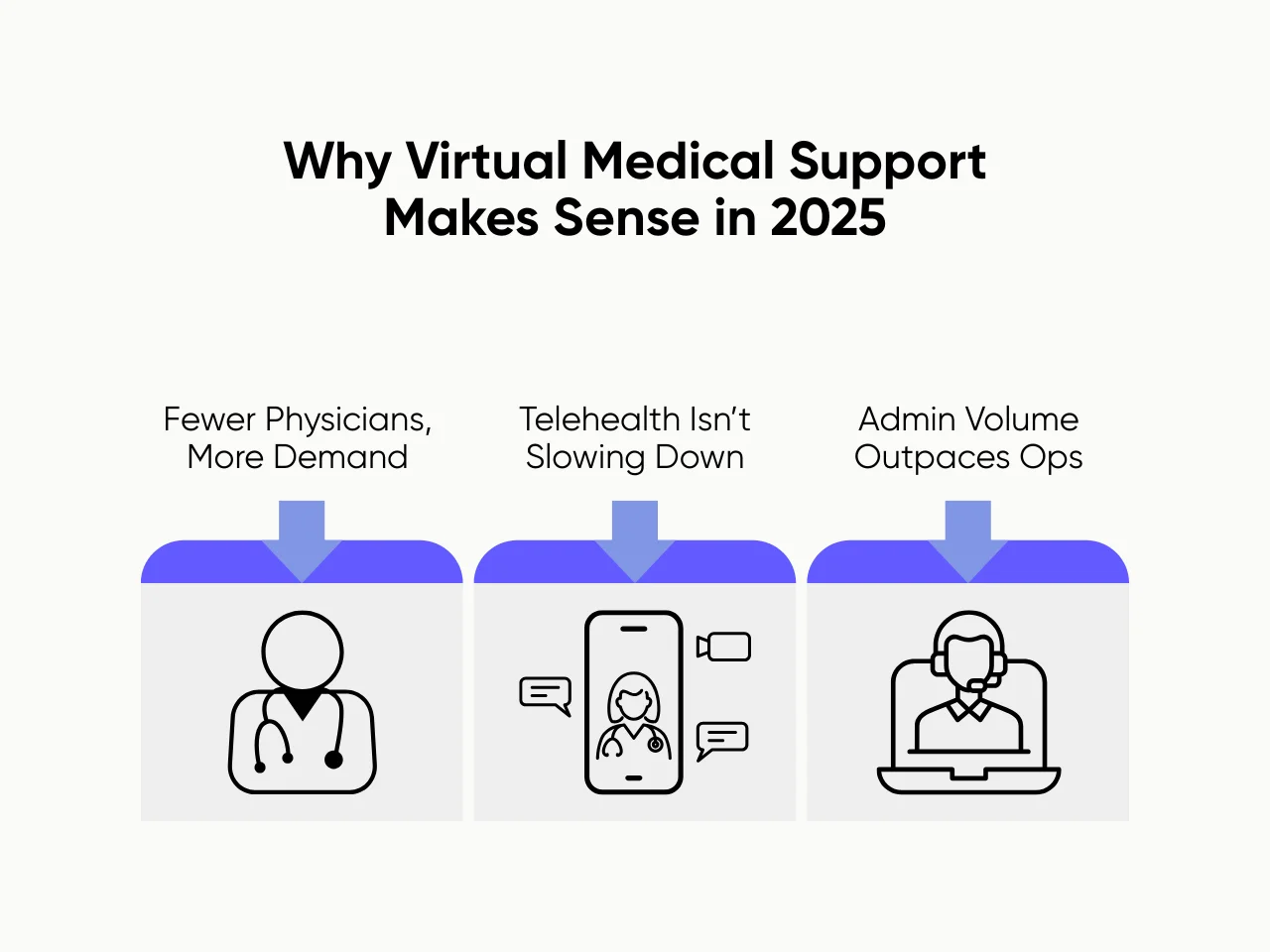
By now, you’ve seen that the healthcare industry isn't just trying to keep up. Most practices are rethinking how they should be run. With more patients, fewer providers, and care happening across more channels, the support model that worked five years ago doesn’t hold up anymore.
That’s why virtual healthcare support isn’t just a cost-saving move. It’s a way to keep your team focused, your operations stable, and your patient interaction consistent going forward.
Let’s walk through what’s pushing healthcare organizations to make the shift now and not later:
Fewer Physicians, More Demand
The shortage of physicians isn’t easing up. With fewer providers in the mix and more demand from your patients, you need to spend your effort where it counts: delivering care, not chasing paperwork.
A virtual medical receptionist helps make that happen. They handle everything from chart updates to eligibility checks to patient coordination. Not in theory, but in your actual healthcare systems, right alongside your team.
At Pearl Talent, we match you with professionals who have years of experience and are already trained for this. You won't have to explain how to enter vitals. They already get it.
Telehealth Isn’t Slowing Down
Digital visits may be making patients’ lives easier, but they add complexity behind the scenes. There’s more messaging, more logistics, and more follow-up to manage.
A virtual assistant for doctors can clean that up. They can confirm appointments, prep digital intake, update records post-visit, and follow up on treatment plans. It’s real-time support, even if no one’s in the building.
Whether you’re already a telehealth provider or looking to incorporate more digital elements into your care delivery, having someone managing these workflows can significantly impact your operations.
Admin Volume Is Outpacing Ops Teams
More patients means more forms, calls, messages, and billing follow-ups. But most front desks are already running behind, and that’s when cracks start showing.
A healthcare VA can pick up the volume without burning out your core team. They handle the high-frequency work so your staff can stay focused and not constantly play catch-up.
When it’s built into your system, that support scales with you, so you can stay ahead rather than panic.
Key Takeaway
The more your clinic grows, the harder it is to justify licensed staff spending hours on admin. You may even realize that you don’t need more effort. You just need better allocation or a better workflow.
That’s where a virtual assistant for doctors can work their magic. They handle the essential but draining work that keeps your team from doing their best clinical work. With remote support, you can focus on delivering quality patient care.
We’ve seen practices stabilize ops, reduce turnover, and reclaim lost hours, not by working harder but by building smarter support underneath their team. This isn’t a shortcut, but a durable solution that scales with you.
Contact us today and explore how Pearl Talent's healthcare outsourcing solutions can support your team!
Frequently Asked Questions
Originally Published
May 14, 2025




.svg)


















